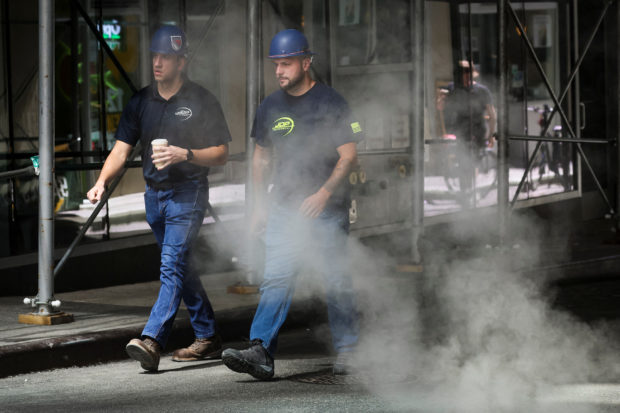Americans endure ‘dragon’s breath’ heat wave, set to last into next week

Workers walk through a cloud of steam during a heatwave in New York City, U.S., July 19, 2022. (REUTERS)
They’re planning days around air conditioning in Oklahoma, monitoring the grid in Texas and keeping an eye out for sharks as they try to cool off in New York.
Across the United States, Americans have been enduring in some cases dangerously high heat that meteorologists say will last into next week.
More than 100 million people are living under excessive warnings or heat advisories this week, according to the National Weather Service.
In Oklahoma City, where a high of 110 Fahrenheit (43 Celsius) was predicted Tuesday, Colin Newman, 40, said it hits like “dragon’s breath” when he steps outside, even in the early hours.
“We plan our days around getting from one air-conditioned place to another,” he said.
Article continues after this advertisementNew Yorkers, meanwhile, are expected to venture to the beaches to cool off. New York Governor Kathy Hochul ordered additional shark monitoring off Long Island, where sharks injured three people this month. Rockaway beaches in Queens were closed to swimmers Tuesday afternoon after a reported shark sighting, according to a New York Police Department tweet.
Article continues after this advertisementThe excessive heat in the United States comes hot on the heels of a heat wave in Europe this week, which has seen wildfires and record temperatures in the kind of weather event that scientists say will become more frequent with climate change.
At least – unlike in Europe – many American homes have air conditioning.
Power use in Texas is expected to break records again this week as homes and businesses crank up their air conditioners, the state’s power grid operator projected on Monday.
For those without easy access to air conditioning in New York, the New York City Fire Department said cooling centers have opened in libraries, community centers and other city buildings and that it on request is installing spray caps on fire hydrants.
In the city, transportation workers were taking precautions such as drinking plenty of water, said Celeste Kirkland, a Transport Workers Union Local 100 subway safety team lead.
“We’re working in some of the hottest places you can think of,” she said.
In Florida’s Port St. Lucie, 52-year-old resident Lisa Kessler was avoiding all outdoor activity until the sun goes down.
“Florida is like getting a hug from a hot bowl of soup,” she said.
Inside Death Valley National Park in California the village of Stovepipe Wells is expected to hit 119 degrees Fahrenheit (48°C) on Tuesday.
But Death Valley is one of the hottest places on Earth and Park Ranger Nico Ramirez said that temperature is normal for this time of year. He likened the local way of coping to how people handle the extreme cold in cooler climes.
“We hibernate in the heat,” he said. “I have a PlayStation and Wi-Fi. If I’m not working, I’m home with my Wi-Fi and music and games.”